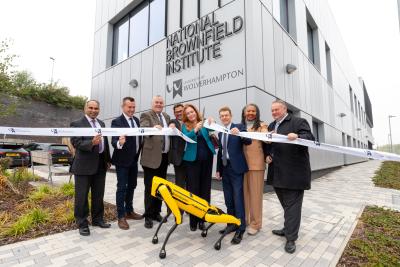The Interim Vice-Chancellor of the University, Professor Ian Campbell, and Professor Chaminda Pathirage from the University’s School of Architecture and Built Environment, welcomed Councillor Ian Brookfield, Leader of City of Wolverhampton Council, Mayor of the West Midlands, Andy Street and Jane Stevenson, MP for Wolverhampton North East to open the building.
The ‘shovel-ready’ project benefited from £14.9million of funding from the Government’s Getting Building Fund for the West Midlands. City of Wolverhampton Council worked closely with the Black Country LEP and West Midlands Combined Authority (WMCA) to secure the funding.
The NBI is a world-class institute that provides the facility to develop modern methods of building through innovation and partnership with the construction industry, focusing on the practical application of future brownfield regeneration and remediation through the work of research teams, leading policy development and commercial services.
The new Institute is ideally placed to identify and address gaps in current provision, with a particular focus on the digital skills needed to transform the industry, bringing together expertise from across the region and further afield with greater focus on construction design, Building Information Modelling (BIM), off-site, modular construction, and lean construction methodologies.
The partnership funding has allowed for investment in state-of-the-art robotic technology including Spot, the agile, mobile robot dog, designed by Boston Dynamics as well as the latest wearable and hand-held laser scanning devices used for high quality reality capture of buildings and sites, and an immersive visualisation suite, Igloo Vision, providing businesses with access to equipment which stimulates collaboration, simulation and visualisation.
The NBI will secure the City of Wolverhampton's position as a leader internationally in sustainable construction, circular economy and brownfield development and will deliver new skills, jobs and opportunities for local people in the city.
Professor Ian Campbell, Interim Vice-Chancellor at the University, said: “We’re delighted to have welcomed partners and our key stakeholders to officially open the National Brownfield Institute today.
“The NBI will be at the heart of a West Midlands Construction Training Offer – providing the industry with the skills needed both now and in the future. As well as being at the forefront of a transformation of the way we will build homes and communities, it will also ensure that we learn from research around the world on modern construction and remediation technique.
“The NBI will help as a catalyst in utilisation of brownfield sites and provide developers with advice and knowledge in relation to areas such as building scanning, soil analysis, ground water contamination and ground stabilisation to effectively bring those sites back into use.”
City of Wolverhampton Council Leader, Councillor Ian Brookfield, said: “The National Brownfield Institute is a game-changing facility that further enhances the Springfield Campus as a leading Built Environment education campus.
“It will enable the City of Wolverhampton to secure its position as a world leader in sustainable construction, circular economy and brownfield development and will deliver new skills, jobs and opportunities for local people in the city.
“Coupled with the dual headquarters for the Department of Levelling Up, Housing and Communities now in Wolverhampton and its associated work on modern methods of construction, the city will be at the forefront of shaping housing policy.
“The National Brownfield Institute forms part of the city’s bold and ambitious regeneration plans that are being powered by more than £4.4billion of investment on site or in the pipeline.”
Andy Street, Mayor of the West Midlands, said: “It's brilliant to be able to come together for the official opening of the National Brownfield Institute (NBI) at the University of Wolverhampton’s Springfield Campus - made possible in part thanks to tens of millions of pounds in Government funding.
“Brownfield first regeneration has long been a key part of my mayoral mission as it helps us to bring derelict sites back into productive use and crucially at the same time helps us to protect the greenbelt. That's why this centre of excellence for brownfield is great news for our region - reinforcing our already widely regarded track record in urban regeneration, pioneering modern methods of construction to accelerate affordable housing supply and equipping local people with the skills they need to work in this rapidly changing sector.”
Tom Westley DL, Chair of the Black Country LEP Board said: “We are delighted that the National Brownfield Institute (NBI) is officially open for business. Thanks to investment through the Black Country LEP, the NBI will secure Wolverhampton's position as an international research centre and leader in sustainable construction, circular economy and brownfield development and will deliver new skills, jobs and opportunities for people in the city and beyond, benefiting the region’s economy into the long-term.”
The 12-acre Springfield Campus is already home to the Thomas Telford University Technical College, Elite Centre for Manufacturing Skills and the recently opened £45million School of Architecture and Built Environment.
These facilities, combined with the NBI, will lay the foundation for the delivery of a National Centre for Sustainable Construction and Circular Economy, which will focus on sustainability and the climate change emergency.
ISG was awarded the contract to build the NBI on the construction super campus, with work starting in April 2021. The £17.5million research centre, designed by Birmingham-based Associated Architects, received planning approval in December 2020.
The NBI project team includes the University’s Estates & Facilities Team, Associate Architects, CPW, Faithful & Gould, Delta Planning, Atkins and MACE.
